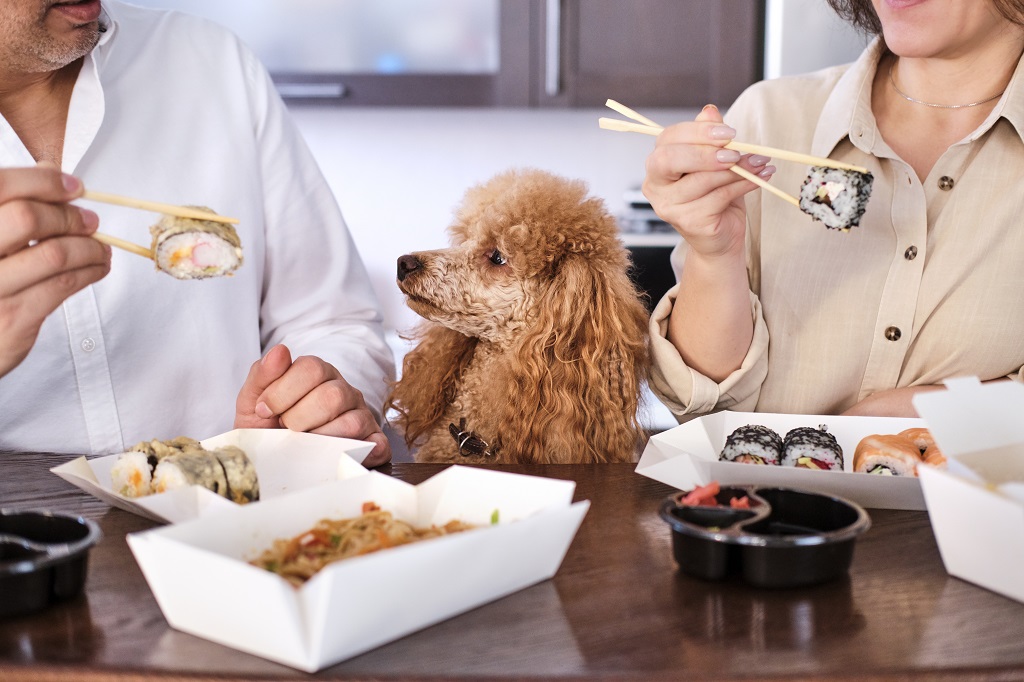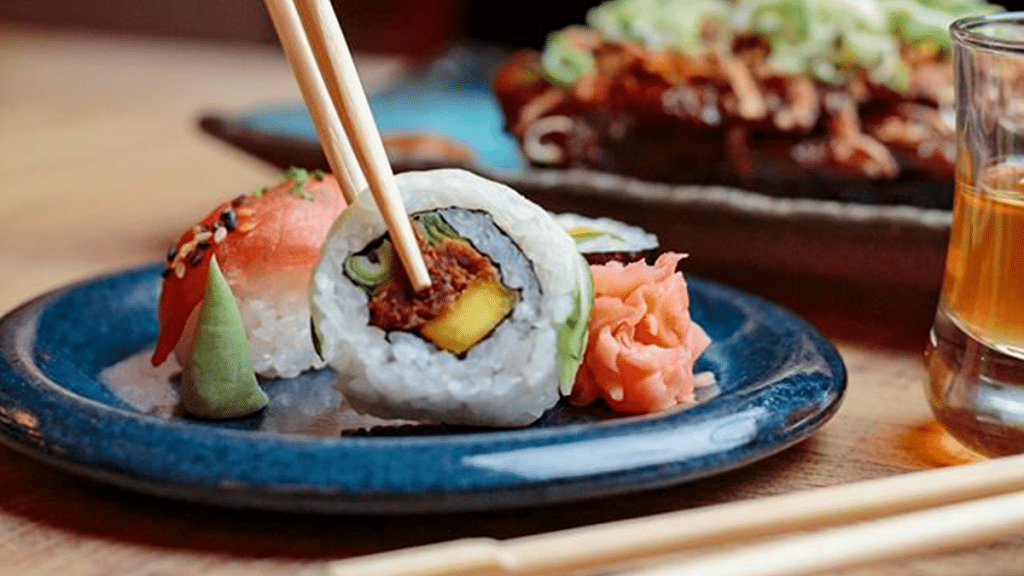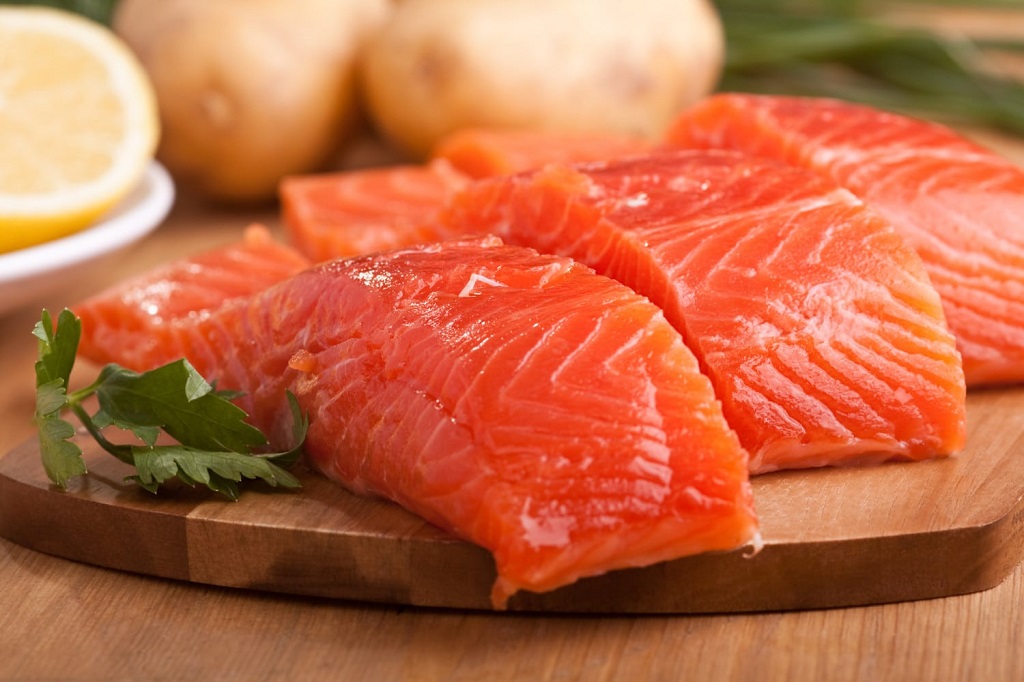
26 Sep Can Dogs Eat Sushi? Unraveling the Canine Sushi Conundrum
Hey there, fellow dog lover! If you’re anything like me, you want to spoil your furry friend with all sorts of treats. And hey, who can blame you? Dogs are, after all, the epitome of unconditional love. But when it comes to sharing your sushi indulgence with your canine companion, things can get a bit tricky. Can dogs eat sushi? Is it safe? Is it a sushi-licious treat or a big no-no? Let’s dive into this sushi conundrum and find out together.
Understanding the Canine Palate
Before we dive into the sushi realm, let’s take a moment to understand our canine buddies’ dietary needs. Dogs are primarily omnivores, which means they can eat both animal and plant-based foods. However, their digestive systems are more attuned to processing animal proteins.
Dogs have a set of sharp teeth designed for tearing and grinding meat, which is a clue that they have evolved to be carnivores. But they’ve also adapted to eat some plant matter, like fruits and vegetables, to complement their diet.
It’s crucial to consider the nutritional value of your pet’s food. If you’re thinking about giving your dog sushi, keep the balance in mind. Sushi has a variety of ingredients, some of which are safe for dogs and some that aren’t. If you’re worried about your dog’s diet or behavior, you might want to explore other ways to keep your pup healthy, like investigating why does my dog pee on his blanket.
Sushi Ingredients: The Good, The Bad, and The Ugly
Alright, let’s break down the components of your average sushi roll. Sushi is a delightful combination of vinegared rice, seafood, vegetables, and sometimes a touch of wasabi and soy sauce. But not all these ingredients are created equal when it comes to your canine friend.
- Rice: The foundation of sushi. Good news! Plain, cooked rice is safe for dogs. It’s easy to digest and can even help soothe an upset stomach.
- Seafood: Here’s where things get a bit tricky. Some seafood, like salmon or tuna, can be a part of a dog’s diet, but it must be fully cooked and devoid of any seasonings or sauces. Raw fish, often used in sushi, can contain parasites and harmful bacteria that could make your dog sick.
- Vegetables: Most vegetables commonly found in sushi, such as cucumber and avocado, are safe for dogs in small amounts. However, you should avoid feeding your dog any vegetables seasoned with spices or sauces.
- Wasabi: That green paste can pack quite a punch for your pup! Wasabi is too spicy for dogs and should be kept far away from their taste buds.
- Soy Sauce: The high sodium content in soy sauce is a no-go for dogs. Excess sodium can lead to salt poisoning, which is dangerous for your furry friend.
You may like to read: What Causes a Dog’s Tongue to Turn Blue?
So, to answer the burning question: Can dogs eat sushi? Yes, they can, but it comes with a big asterisk. You’ll need to make some adjustments to ensure their safety and health.
Safe Sushi Options for Dogs
If you’re determined to share your sushi experience with your four-legged friend, you can do so with caution. Here’s a rundown of some safe sushi options for dogs:
- Cooked Salmon or Tuna: Remember, it has to be fully cooked and free from any seasonings or sauces. Remove any bones and flake the fish into small, manageable pieces for your pup.
- Plain Cucumber Rolls: Cucumbers are a hydrating and safe option for dogs. Just ensure they are plain and free from any spices or sauces.
- Rice Balls: Plain, cooked rice can be a great treat for dogs. You can make little rice balls without any seasoning for your furry friend to enjoy.
- Seaweed: Small amounts of plain, dried seaweed can be safe for dogs. It’s a good source of minerals and can make for a crunchy snack.
- Vegetable Rolls (Without Seasoning): If you’re feeling adventurous, you can offer your dog vegetable rolls that contain safe ingredients like carrots, cucumbers, and cooked sweet potatoes. Just be sure they are free from any seasoning or sauces.
But Remember: Moderation is Key
While these sushi options can be given to your dog in moderation, it’s important not to make them a regular part of their diet. Sushi should be an occasional treat, not a daily indulgence.
Feeding your dog too much sushi, especially if it contains ingredients that are new to their diet, can lead to digestive upset. Always start with a small amount and observe how your dog reacts. If they show any signs of discomfort, such as vomiting or diarrhea, it’s best to skip the sushi treat altogether.
Sushi Sins: What to Avoid at All Costs
Now that we’ve covered what’s safe for your dog to eat, let’s talk about the sushi sins you should absolutely avoid:
- Raw Fish: As mentioned earlier, raw fish can harbor harmful parasites and bacteria that can make your dog sick. It’s best to steer clear of it entirely.
- Wasabi and Soy Sauce: The spicy kick of wasabi and the high sodium content in soy sauce can be detrimental to your dog’s health. Keep them away from these condiments.
- Sushi with Spicy Sauces: Sushi rolls that are drenched in spicy mayo or other fiery sauces should be off-limits for your pup. The spice and seasonings can upset their stomach.
- Sushi with Added Ingredients: Sushi rolls often contain ingredients like sesame seeds or spicy seasonings that can be problematic for dogs. Stick to plain and simple options.
Conclusion
So, can dogs eat sushi? The answer is a cautious yes, with a dash of responsibility. While some sushi ingredients can be safe for your canine companion, others are definite no-nos. Always opt for plain and simple options, free from seasonings, sauces, and spices. And remember, moderation is key. Sushi should be an occasional treat, not a staple in your dog’s diet.
Now that you’re armed with the knowledge of what’s safe and what’s not, you can enjoy a sushi soiree with your furry friend, making sure their tails wag with joy, not discomfort. So, go ahead, share a sushi roll, snap a cute Instagram pic, and savor the moments with your loyal sushi-loving sidekick.
Just one last piece of advice: Keep your sushi stash out of reach, because if your dog gets their paws on it unsupervised, you might come home to a sushi crime scene that even Sherlock Holmes couldn’t solve!
FAQs
- Can dogs eat sushi rice?
Absolutely! Plain, cooked rice is safe for dogs and can be a great addition to their diet in moderation. It’s easy to digest and can even help soothe digestive issues. - Is it safe to give dogs cooked seafood from sushi?
Yes, it can be safe to offer your dog cooked seafood from sushi, such as fully cooked salmon or tuna. Just be sure it’s plain and free from any seasonings or sauces. - Can dogs have avocado sushi rolls?
Avocado should be avoided in your dog’s sushi. While the flesh itself isn’t toxic, it contains a substance called persin that can be harmful to dogs in large amounts. - What should I do if my dog accidentally eats raw sushi?
If your dog consumes raw sushi, monitor them closely for any signs of illness, such as vomiting, diarrhea, or lethargy. If you notice any concerning symptoms, contact your veterinarian immediately. - How often can I give my dog sushi?
Sushi should be an occasional treat for your dog, not a regular part of their diet. Feeding them sushi too frequently can lead to digestive upset and health issues. Stick to small, infrequent servings.

Sorry, the comment form is closed at this time.